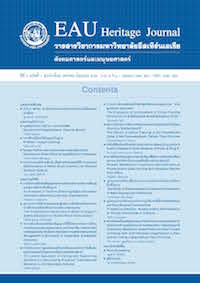บุพนิมิตทางการศึกษา: ชาวนาบัณฑิต
Keywords:
บุพนิมิตทางการศึกษา, ชาวนาบัณฑิต, Educational Enlightenment, Chao-Na BunditAbstract
ชาวนาคือกระดูกสันหลังของชาติ แต่ในสถานการณ์ปัจจุบันชาวนามี “พื้นที่” (space) น้อยมาก ภาพที่ปรากฏ ชาวนายังถูกเอารัดเอาเปรียบจากนายทุน และขาดการดูแลจากรัฐ โดยเฉพาะการส่งผ่านข้อความรู้ในระบบโรงเรียน ชาวนาบัณฑิต เป็นอีกหนึ่งกระบวนทัศน์ใหม่ของการศึกษาไทยที่สถาปนาความศักดิ์สิทธิ์ของคน “รากหญ้า” ให้ กลับกลายเป็นคนรากแก้ว บุพนิมิตทางการศึกษานี้จำเป็นอย่างยิ่งที่ต้องมีหลักสูตรที่อิงแอบกับวัฒนธรรมข้าวภูมิปัญญา ท้องถิ่น ความรู้พื้นบ้านเพื่อการสร้างอัตลักษณ์ การเรียนรู้ที่เน้นการส่งผ่านข้อความรู้เชิงปฏิบัติการผสมผสานแนวคิด ทฤษฎีแห่งความเป็นวิชาการ ส่วนการประเมินผลนั้นจำเป็นที่จะต้องเน้นความจริงสูงสุดแห่งการเข้าใจ การเข้าถึง แห่งรัฐชาติไทยในปริบทของสังคมเกษตรกรรม ฉะนั้นการจัดการเรียนการสอนเพื่อชาวนาให้มี “พื้นที่ทางการศึกษา” มากขึ้นคงเป็นอีกหนึ่งของสัญญะของการพัฒนาแบบยั่งยืน
Educational Enlightenment: Chao-Na Bundit
Generally known, chao-na is a back bone of the nation. The present situation, chao-na has himself a scant space in any spheres of society especially in economic context. Chao-na is an exploited people who lack of an educational opportunity in schooling system. Chao-na Bundit is a new paradigm of “grassroots” people who is encouraged to be a tap root of the nation in the present day. As mentioned of educational enlightenment already, chao-na has to have at least the fulfillment in the three aspects; the designed curriculum will be based on rice culture, local wisdom and indigenous knowledge for his identity, while the instruction must transfer the category of knowledge and body of knowledge into practicum. For the evaluation process, ultimate reality (metaphysics) of this process must evaluate in how the students have a fruitful understanding in the agricultural context for sustainability.





